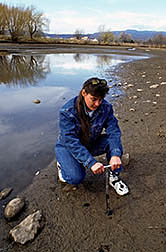Cleaner Well Water
Scientists try salad oil to decontaminate groundwater.
A novel idea is under study in Colorado: using vegetable oils to clean groundwater contaminated with nitrogen fertilizers.
One approach might be to inject the oil under pressure into the base of existing wells, where it would become trapped among the soil particles to form an organic filter.
"When groundwater is pumped from the wells, it would have to pass through this oil filter," says Agricultural Research Service microbiologist William J. Hunter. "The oil provides a carbon source for enhancing the population of natural microorganisms that 'eat' the nitrate, converting it into harmless nitrogen gas."
Excess nitrate in drinking water poses a health threat to both humans and farm animals. It has been linked to infant diseases and cancer. The health standard is 10 parts per million of nitrate-nitrogen in water.
Studies have shown that drinking water in many U.S. areas is polluted with nitrate. Nitrate is a form of nitrogen that, when not managed with care, can move downward through the soil and contaminate groundwater supplies. Applying too much fertilizer, excessive irrigation, and mishandling cattle manure in farm operations are among the more common causes of groundwater nitrate contamination.
However, "Both corn and soybean oil rapidly stimulate bacterial denitrification," says Hunter who is in ARS' Soil-Plant Nutrient Research Unit in Fort Collins, Colorado. "This even works at nitrate concentrations that are 200 times higher than the maximum permissible level for drinking water."
To mimic various natural conditions, scientists used laboratory columns of packed soil in their initial work. Columns that received only a single oil treatment continued to work for more than a year. Based on these studies, the scientists estimate that 1½ quarts of soybean oil could remove 10 parts per million of nitrate-nitrogen from about 10,000 gallons of contaminated water.
Corn and soybean oils—both plentiful and inexpensive—were used in the studies. Other vegetable oils could also be used.
"This approach is much simpler and cheaper than approaches that be designed to intercept and treat nitrate-contaminated water before it reaches groundwater," says ARS soil scientist Ronald F. Follett.
However, water from these treated wells could have an odor or unusual taste. For example, if naturally occurring sulfur is present, the water might have a rotten egg smell. So research is under way to determine if this will be a problem with some oil-treated waters.
Methyl and ethyl alcohol could also be used to stimulate microbial denitrifiers to clean contaminated water. However, they cannot be used in many situations, because they readily mix with the groundwater and will move with it.
But oils are insoluble in water and form a plume of tiny droplets when injected under pressure. These oil droplets become trapped on soil particles within the aquifer and stay in place near the bottom of the well.
These preliminary results were obtained from experimental soil columns. Soil and water for the columns came from a shallow aquifer located in the San Luis Valley in southern Colorado. Even though flow rates of water through the soil columns were considerably higher than would be expected in the aquifer, denitrification still occurred.
"We hope to run tests under actual field conditions at the South Platte River Aquifer in northern Colorado," says Hunter. "Although we are using all natural products, we will have to ensure no environmental regulations are compromised."
This test area contains soils that are typical of many where nitrate if pollution is a problem.
In a recent ARS study covering 248 square miles of Colorado's South Platte River Valley, only about 30 percent of the water tested met drinking water standards. In some areas, nitrate levels exceeded the maximum permissible level by a factor of four. This has forced several communities to abandon their wells and to pipe or haul cleaner water to their residents—a very costly practice. — By Dennis Senft, ARS.
William J. Hunter is in the USDA-ARS Soil-Plant Nutrient Research Unit, 2150 Centre Avenue, Fort Collins, CO 80549; phone (970) 492-7208, fax (970) 492-7213.
Ronald F. Follett is in the USDA-ARS Soil-Plant Nutrient Research Unit, 2150 Centre Avenue, Fort Collins, CO 80549; phone (970) 492-7220, fax (970) 492-7213.
"Cleaner Well Water" was published in the July 1995 issue of Agricultural Research magazine.







